英语中常见的同义词集锦
初中英语同义词

初中英语同义词同义词是指在不改变句子意思的前提下,用不同的词语来表达相同的含义。
在学习英语的过程中,掌握同义词是非常重要的,可以帮助我们扩大词汇量,提升写作和阅读的能力。
本文将为大家介绍一些初中英语中常见的同义词。
一、名词同义词1. teacher - educator2. student - pupil3. friend - companion4. book - volume5. school - institution6. car - automobile7. house - residence8. city - metropolis9. computer - machine10. animal - creature二、形容词同义词1. good - excellent2. bad - terrible3. happy - joyful4. sad - unhappy5. beautiful - gorgeous6. ugly - unattractive7. big - large8. small - little9. interesting - engaging10. difficult - challenging三、动词同义词1. go - travel2. see - observe3. eat - consume4. talk - converse5. help - assist6. study - learn7. play - participate8. write - compose9. read - peruse10. sleep - slumber四、副词同义词1. very - extremely2. quickly - rapidly3. slowly - gradually4. well - skillfully5. often - frequently6. always - consistently7. never - nervertheless8. here - there9. now - presently10. also - as well五、连词同义词1. and - furthermore2. but - however3. or - alternatively4. because - since5. if - in case6. although - though7. so - therefore8. yet - nevertheless9. while - whereas10. when - as总结:通过掌握初中英语中常见的同义词,我们可以丰富词汇,使语言更加有表现力。
英语中常见的同义词(组)集锦
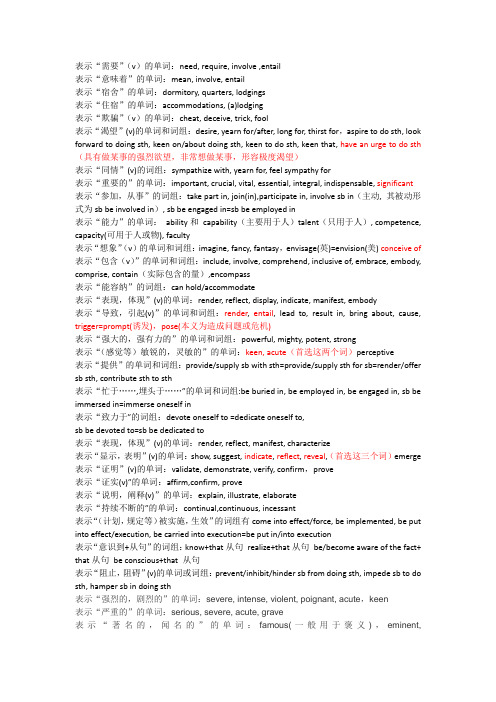
表示“需要”(v)的单词:need, require, involve ,entail表示“意味着”的单词:mean, involve, entail表示“宿舍”的单词:dormitory, quarters, lodgings表示“住宿”的单词:accommodations, (a)lodging表示“欺骗”(v)的单词:cheat, deceive, trick, fool表示“渴望”(v)的单词和词组:desire, yearn for/after, long for, thirst for,aspire to do sth, look forward to doing sth, keen on/about doing sth, keen to do sth, keen that, have an urge to do sth (具有做某事的强烈欲望,非常想做某事,形容极度渴望)表示“同情”(v)的词组:sympathize with, yearn for, feel sympathy for表示“重要的”的单词:important, crucial, vital, essential, integral, indispensable, significant表示“参加,从事”的词组:take part in, join(in),participate in, involve sb in(主动, 其被动形式为sb be involved in), sb be engaged in=sb be employed in表示“能力”的单词:ability和capability(主要用于人)talent(只用于人), competence, capacity(可用于人或物), faculty表示“想象”(v)的单词和词组:imagine, fancy, fantasy,envisage(英)=envision(美) conceive of 表示“包含(v)”的单词和词组:include, involve, comprehend, inclusive of, embrace, embody, comprise, contain(实际包含的量),encompass表示“能容纳”的词组:can hold/accommodate表示“表现,体现”(v)的单词:render, reflect, display, indicate, manifest, embody表示“导致,引起(v)”的单词和词组:render, entail, lead to, result in, bring about, cause, trigger=prompt(诱发),pose(本义为造成问题或危机)表示“强大的,强有力的”的单词和词组:powerful, mighty, potent, strong表示“(感觉等)敏锐的,灵敏的”的单词:keen, acute(首选这两个词)perceptive表示“提供”的单词和词组:provide/supply sb with sth=provide/supply sth for sb=render/offer sb sth, contribute sth to sth表示“忙于……,埋头于……”的单词和词组:be buried in, be employed in, be engaged in, sb be immersed in=immerse oneself in表示“致力于”的词组:devote oneself to =dedicate oneself to,sb be devoted to=sb be dedicated to表示“表现,体现”(v)的单词:render, reflect, manifest, characterize表示“显示,表明”(v)的单词:show, suggest, indicate, reflect, reveal,(首选这三个词)emerge 表示“证明”(v)的单词:validate, demonstrate, verify, confirm,prove表示“证实(v)”的单词:affirm,confirm, prove表示“说明,阐释(v)”的单词:explain, illustrate, elaborate表示“持续不断的”的单词:continual,continuous, incessant表示“(计划,规定等)被实施,生效”的词组有come into effect/force, be implemented, be put into effect/execution, be carried into execution=be put in/into execution表示“意识到+从句”的词组:know+that从句realize+that从句be/become aware of the fact+ that从句be conscious+that 从句表示“阻止,阻碍”(v)的单词或词组:prevent/inhibit/hinder sb from doing sth, impede sb to do sth, hamper sb in doing sth表示“强烈的,剧烈的”的单词:severe, intense, violent, poignant, acute,keen表示“严重的”的单词:serious, severe, acute, grave表示“著名的,闻名的”的单词:famous(一般用于褒义),eminent,distinguished,(well-)known(褒贬均可),renowned, famed, conspicuous表示“臭名昭著的”的单词:notorious, infamous表示“显著的,引人注目的”的单词:remarkable, conspicuous, significant(首选这三个词)distinguished, noticeable, outstanding, striking表示“枯燥乏味的,沉闷的”的单词:dull, boring, tedious, dreary, monotonous表示“有利于,有助于”的词组:contribute to=be good for=be beneficial/conducive to表示“限制”(n)的单词:bound, limit, limitation, restriction, confine, constraint表示“限制”(v)的单词: limit, restrict, confine, constrain表示“易传染的,传染性的”的单词:contagious, infectious表示“(表意,言辞等)不明确的,模糊的,模棱两可的”的单词:ambiguous, implicit, vague, obscure, indefinite,unclear表示“区分A和B”的词组:distinguish A from/and B, discriminate/differentiate between A and B, discriminate A from B,make a distinction between A and B表示“赋予……特征”的单词:distinguish, feature, characterize表示“象征(v)”的单词: symbolize, represent(有“表示”的意思), embody(有“蕴含”的意思)表示“消化,吸收(v)”的单词:digest, absorb, assimilate表示“帮助”(v)的词组:assist sb in doing sth=help/assist sb to do sth表示“面对”的单词:face, confront(首选), envisage表示“面对……”的词组:face /confront/envisage sth= be faced/confronted with sth表示“……圈,……界”的单词:arena, sphere, circle, realm表示“法律,法规”的单词:regulation, law, legislation表示“调整,调节”(n)的单词:adjustment, regulation, conditioning, modulation表示“使某人自己适应某物/做某事”的词组:adjust/ adapt/accustom/condition oneself to sth/doing sth=adjust/adapt oneself to sth/doing sth (以上强调从不适应或习惯变为适应或习惯的过程) sb be used/accustomed to sth/doing sth.(强调状态)表示“(在法律,道德等层面上)义务性的,强制性的,(课程等)必修的”的单词:obligatory, compulsory, mandatory表示“决定……”的词组:be determined/resolved to do sth=determine/resolve to do sth, determine/resolve that…= be determined/resolved that…, decide to do sth, decide that…表示“建议,主张”(v)的单词:suggest, recommend, advocate, propose, urge(极力主张)表示“主张(n)”的单词:advocacy, proposal, proposition表示“支持者,拥护者”的单词:supporter, proponent, advocate, protagonist表示“主要的”的单词:main, major, principal, primary表示“变化,改变”(v)的单词和词组:change, vary, alter, modify, transform, convert, turn, metamorphose, transmute,Change / convert/transform/ turn/alter A into B表示“变化,改变(n)”的单词:alteration, change, modification, conversion, metamorphosis (彻底改变),transmutation(转变为具有一种与原来完全不同的状态或形式的事物)transformation(变为与原事物完全不同的事物)表示“变更计划”时用alter/alteration, 表示“修订(书籍等)时”用revise/ revision(如the 5th edition——completely revised!)表示“衣橱”的单词:closet, dresser, wardrobe表示“阻碍,阻止”(v)的单词:prevent, impede, inhibit, hinder, obstruct, bar表示“微生物”的单词:microorganism, microbe表示“细菌”的单词:germ(病菌), bacteria表示“修改”(v)的单词:modify, adapt, revise(修改文章, 修订书籍等) correct(改正/更正错误), alter表示“忠诚的,真诚的,真挚的”的单词:loyal, faithful, sincere, devoted,earnest表示“忠诚(n)”的单词:loyalty, devotion, sincerity, faithfulness, allegiance表示“选择”(n)的单词:choice, alternative, option表示“替代品”的单词:alternative, substitution, substitute表示“后面的”的单词:hinder, back, rear表示“养老院,敬老院”的单词和词组:gerocomium, geracomium(both are not available in paper dictionaries at present), old people’s home, home for the elderly/aged, seniors’home, nursing home表示“太平间”的单词和词组:morgue, mortuary, dead room表示“专门地,有针对性地”:specially(特地,专门地)specifically(首选), exclusively (专门地,只限于)表示“不同,差异”的单词:difference, distinction, variation(change or slight difference) 表示“爱好,喜好”的单词:hobby, fancy, preference表示“隔离”(v)的单词:separate, isolate, insulate, segregate, quarantine表示“合理的”的单词:reasonable, satisfactory, decent (首选这三个词),rational, logical 表示“正直的”的单词:righteous, decent(首选这两个词), honest表示“正直(n)”的单词:integrity, righteousness, (首选这两个词) honesty表示“vt&vi 注册,登记”的单词:register, enroll(=enrol)表示“鼓舞(n)”的单词:encouragement, incentive, stimulation表示“刺激,激励(n)”的单词:incentive, stimulation, stimulus表示“符号,标志”的单词:symbol, icon, mark, sign, notation表示“目标”的单词:object, objective, aim, goal表示“目的”的单词:object, objective, aim, purpose表示“A在B之前”的词组:A be prior/preliminary to B, A be before B, A precedes B表示“完整的,完全的”的单词:intact, complete, prefect表示“渺小的,微不足道的”的单词:tiny, negligible, insi g nificant(g不发音),minute表示“深入的,彻底的”的单词:in-depth, thorough, intensive, exhaustive表示“详尽的”的单词或词组:elaborate, at large, in (minute)detail, detailed, comprehensive, minute, exhaustive(极其详尽的,详尽无遗的)表示“过时的”的单词:outdated, outmoded, obsolete, old-fashioned表示“A与B有关”的词组:A be related/relevant to B, A concerns B,A relates/pertains to B表示“A 与B一致/相符”的词组:A be in accord/accordance/agreement with B, A be corresponding to, A corresponds to B, A be in correspondence to B表示“影响(n&v)”的单词:affect(过程,vt, -), effect(结果,n,+-均可), influence(n&vt, +-均可),impact(结果,u&vt, +-均可)( +-分别表示“积极的”和“消极的”)表示“足够的”的单词:adequate, ample, sufficient, enough表示“同情(n)”的单词:sympathy, compassion(比pity更正式), pity表示“冷淡的,冷漠的”的单词:indifferent, apathetic, dispassionate表示“激怒(v)”的单词:anger, annoy(惹恼), irritate, aggravate, infuriate(使狂怒)表示“(使)恶化(v)”的单词和词组:get/become worse, worsen, aggravate(vt), deteriorate(vi)表示“惩罚(v)”的单词: punish, penalize表示“惩罚(n)”的单词: punishment, penalty表示“忏悔(v)”的单词:repent, confess表示“忏悔(n)”的单词: penitence, repentance, confession表示“倾向于(做)……,容易(做)……”的词组:be prone/inclined(均为adj) to (do) sth, tend(vi) to do sth表示“易受……影响的”:be su scep tible/vulnerable to (doing) sth表示“易受……的伤害的,易患……疾病的”:be susceptible/vulnerable to (do) sth,be prone to (do) sth表示“(证据)确凿的”的单词:conclusive(absolutely true), concrete(definite and specific), Solid(reliable and based on facts)表示“保证,担保(v)”的单词:assure, ensure, guarantee表示“节奏,步调”的单词:rhythm, pace, tempo表示“观念,意识”的单词:conception, awareness(偏重“意识”)【表示“观念”用conception,表示“意识”用conception或awareness均可】表示“认识(n)”的单词:conception,perception,understanding, view表示“理解,看法(n)”的单词:understanding(偏重“理解,认识”(n)), perception, perspective, view, notion表示“洞察力”的单词:insight, perspective, perception(均不可数)表示“提升,加强(vt)”的单词:improve, enhance, increase, heighten, raise如:improve/enhance/increase /heighten /raise awareness表示“敏锐的”的单词:acute, keen ,perceptive表示“视野(n)”的单词:vision, horizon, perspective(本义为“视角, 角度”=point of view)view表示“拓宽,扩大(v)”的单词:expand, broaden, widen, enlarge表示“促使(v)”的动词:prompt, drive(多用于不好的情况), induce表示“例如”的词组(用于句首):For example/instance, To illustrate=To be specific 表示“风景名胜”的词组:place of interest, tourist destination/attraction,scenic spot/attraction表示“拓展视野”的词组:broaden/widen/expand/enlarge one’s vision/horizon/perspective表示“发出信号”的词组:send (out) a signal, emit a signal表示“散发气味”的词组:give off/ release/ emit a specific kind of smell表示“散发光或热”的词组:radiate/ emit/ give off/ send out light/ heat表示“释放(排放)气体”的词组:release/ emit/ give off gases表示“发出警报声”的词组:emit/ send out/ produce an alarming sound表示“增强某物的强度,加剧”的单词:intensify(vi&vt) (好坏均可) ,amplify(vt)(好坏均可),escalate(vi&vt, 坏), deteriorate(vi, 坏), aggravate(vt, 坏)。
英语同义词大全
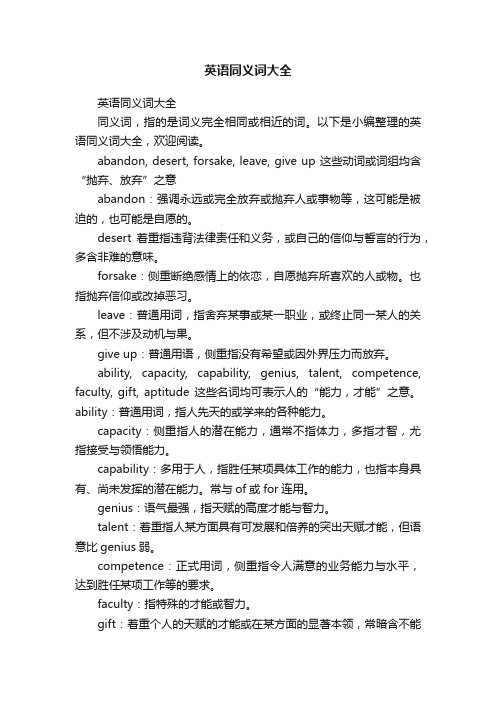
英语同义词大全英语同义词大全同义词,指的是词义完全相同或相近的词。
以下是小编整理的英语同义词大全,欢迎阅读。
abandon, desert, forsake, leave, give up 这些动词或词组均含“抛弃、放弃”之意abandon:强调永远或完全放弃或抛弃人或事物等,这可能是被迫的,也可能是自愿的。
desert 着重指违背法律责任和义务,或自己的信仰与誓言的行为,多含非难的意味。
forsake:侧重断绝感情上的依恋,自愿抛弃所喜欢的人或物。
也指抛弃信仰或改掉恶习。
leave:普通用词,指舍弃某事或某一职业,或终止同一某人的关系,但不涉及动机与果。
give up:普通用语,侧重指没有希望或因外界压力而放弃。
ability, capacity, capability, genius, talent, competence, faculty, gift, aptitude 这些名词均可表示人的“能力,才能”之意。
ability:普通用词,指人先天的或学来的各种能力。
capacity:侧重指人的潜在能力,通常不指体力,多指才智,尤指接受与领悟能力。
capability:多用于人,指胜任某项具体工作的能力,也指本身具有、尚未发挥的潜在能力。
常与of或for连用。
genius:语气最强,指天赋的高度才能与智力。
talent:着重指人某方面具有可发展和倍养的突出天赋才能,但语意比genius弱。
competence:正式用词,侧重指令人满意的业务能力与水平,达到胜任某项工作等的要求。
faculty:指特殊的才能或智力。
gift:着重个人的天赋的才能或在某方面的显著本领,常暗含不能用一般规律作解释的意味。
aptitude:多指先天或后天习得的运用自如的能力,常暗示接受能力强,能迅速掌握一种学术训练或艺术技巧。
able, capable, competent 这些形容词均含有“有能力的,能干的”之意able:最常用词,多用于褒义,着重指多方面的,经常性的,或潜在性的能力。
六年级英语同义词大全
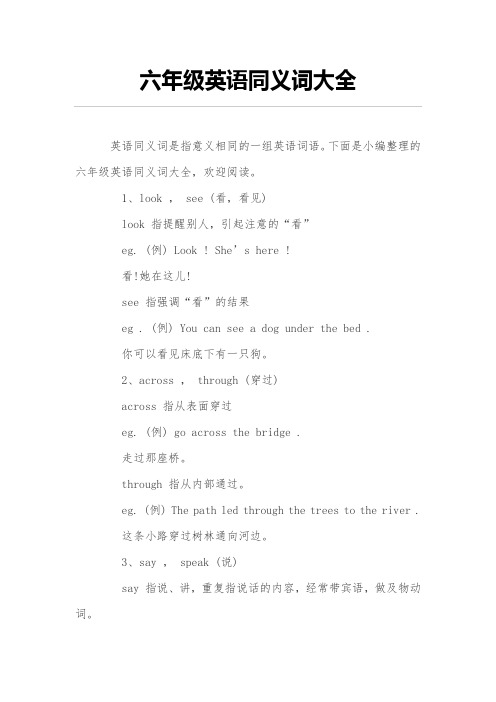
六年级英语同义词大全英语同义词是指意义相同的一组英语词语。
下面是小编整理的六年级英语同义词大全,欢迎阅读。
1、look , see (看,看见)look 指提醒别人,引起注意的“看”eg. (例) Look ! She’s here !看!她在这儿!see 指强调“看”的结果eg . (例) You can see a dog under the bed .你可以看见床底下有一只狗。
2、across , through (穿过)across 指从表面穿过eg. (例) go across the bridge .走过那座桥。
through 指从内部通过。
eg. (例) The path led through the trees to the river .这条小路穿过树林通向河边。
3、say , speak (说)say 指说、讲,重复指说话的内容,经常带宾语,做及物动词。
eg . (例) He said that he was busy .他说他很忙。
Speak 说话、演讲,着重强调说的动作,不注重说的内容,一般做不及物动词。
做及物动词时的宾语只能是语言或truth (真理、事实)eg . (例) Do you speak Chinese ?你说汉语吗?The baby is learning to speak .这孩子们在学习讲话。
4、borrow , lend (借)borrow 从主语角度讲是“借来,借进”,常为“borrow sth . From sb .”。
eg .(例) She borrowed some books from your sister .她从你姐姐那里借来了一些书。
lend 从主语的角度讲是“借出”,常为“lend sth . to sb .”或“lend sb . sth .”eg .(例) He lent me a pen .他把钢笔借给我。
5、correct , right (正确的)c orrect “正确的,恰当的”,有纠正的含义,较正式,可做动词。
常见英语同义词
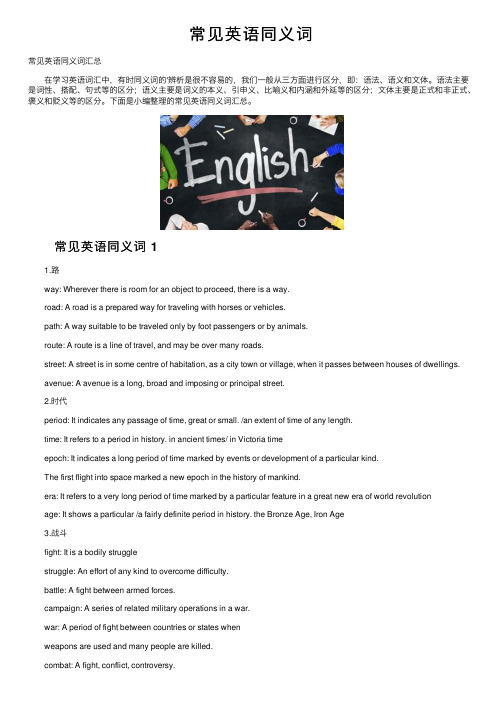
常见英语同义词常见英语同义词汇总 在学习英语词汇中,有时同义词的'辨析是很不容易的,我们⼀般从三⽅⾯进⾏区分,即:语法、语义和⽂体。
语法主要是词性、搭配、句式等的区分;语义主要是词义的本义、引申义、⽐喻义和内涵和外延等的区分;⽂体主要是正式和⾮正式、褒义和贬义等的区分。
下⾯是⼩编整理的常见英语同义词汇总。
常见英语同义词 1 1.路 way: Wherever there is room for an object to proceed, there is a way. road: A road is a prepared way for traveling with horses or vehicles. path: A way suitable to be traveled only by foot passengers or by animals. route: A route is a line of travel, and may be over many roads. street: A street is in some centre of habitation, as a city town or village, when it passes between houses of dwellings. avenue: A avenue is a long, broad and imposing or principal street. 2.时代 period: It indicates any passage of time, great or small. /an extent of time of any length. time: It refers to a period in history. in ancient times/ in Victoria time epoch: It indicates a long period of time marked by events or development of a particular kind. The first flight into space marked a new epoch in the history of mankind. era: It refers to a very long period of time marked by a particular feature in a great new era of world revolution age: It shows a particular /a fairly definite period in history. the Bronze Age, Iron Age 3.战⽃ fight: It is a bodily struggle struggle: An effort of any kind to overcome difficulty. battle: A fight between armed forces. campaign: A series of related military operations in a war. war: A period of fight between countries or states when weapons are used and many people are killed. combat: A fight, conflict, controversy. 4.牧师 priest: A person, esp. a man specially trained for various religious duties and ceremonies, in the Christian church, esp. in the Roman Catholic church minister: A member of clergy, esp. Protestant churches. clergy: The officially appointed leader of the religious activities of a particular church or temple. clergyman: clergymen a member of clergy. pastor: A Christian religious leader in charge of a church and its members, esp. in a Protestant church. vicar: A priest in charge of an area in the church of England. father: A little of respect for a priest, esp. in the Roman Catholic. 5.服装 clothing: General term of clothes. clothes: Coverings of the body such as coats, dresses, suits, shoes, hats. garment: A suit of clothes used by actors./a single article of clothing. costume: 1) The fashion of dress peculiar to a people, nation, class, period, etc. 2) A dress worn by actors in a play. uniform: worn by all members of the community. dress: 1) A kind of outer garment worn by women . 2) worn on special occasions evening dress/ morning dress suit: A set of outer clothes to be worn together. evening suit/swimming suit coat: A garment with sleeves worn on top of other clothes from rain, heat, etc. overcoat: A warn coat worn in the street. 6.哭 cry: The most general one. weep: To let flow tears. sob: To weep or sigh with short quick breaths. snivel: To sniffle and cry in a irritating manner. blubber: To cry loudly noisily. whine: To make a low complaining cry. bawl: To utter loud cries . wail: To cry aloud from pain or sorrow. moan: To make a low, miserable sound in pain or sorrow. grown: To make a low sound of pain, unhappiness or disapproval mourn: To feel or show sadness or sorrow for someone who has died. lament: To express great sorrow or regret. 7.美丽漂亮 good-looking: Having an attractive appearance in a strong, healthy way used for men and women not things. beautiful: Suggesting symmetry of features or perfection of proportion, elegance and mobility. beautiful flowers, a beautiful girl/voice/city/face beautiful weather. handsome: Of attractive appearance applies to men. a handsome fellow/actor/horse/buildings/young man. pretty: Suggesting liveliness and sweetness, pleasing or nice to look at. a pretty little woman/garden, a pretty girl/ picture/piece of music, lovely: So beautiful that it makes you feel good to look at it or even to think about it. The garden looks lovely. fair: Beautiful light in color esp., skin hair. gorgeous: Extremely beautiful or handsome. 8.拉拖 pull: The most general one. draw: It implies a smoother, steadier motion and generally a lighter force than pull. drag: It usually refers to horizontal motion or motion up an incline and it suggests laborious efforts over rough ground or against friction, resistance or gravity. The escaped prisoner was dragged out of his hiding place. haul: It implies continuous pulling or dragging of heavy or bulky objects. The fisherman is hauling a net. tug: It applies to hard often sudden violent effort to pull. He tugged at my sleeve to ask directions. jerk: To pull suddenly. He jerked out the knife that was stuck in the wound. tow: To pull by a rope or chain. We towed the car to the nearest garage. wrench: To pull hard with a twisting or turning movement. 9.旋转 turn: The most general one. spin: To turn quickly around a central point. It emphasizes the continuity of the action, and usually the narrow extent of the circular motion. The wheel is spinning on its axis. whirl: To round very fast.。
初中英语中的同义词和反义词总结

初中英语中的同义词和反义词总结在学习英语的过程中,同义词和反义词是我们常常会遇到的词汇。
同义词指的是意思相近或相同的词语,而反义词则是指意思相反的词语。
掌握同义词和反义词不仅可以丰富我们的词汇量,还能提高我们的表达能力。
下面,我将总结一些初中英语中常见的同义词和反义词。
一、同义词1. Happy - glad这两个词都表示“高兴”的意思,但happy更常用于日常口语,而glad则更常用于书面语。
2. Big - large这两个词都表示“大”的意思,但big更常用于描述大小,而large则更常用于描述规模。
3. Beautiful - pretty这两个词都表示“美丽”的意思,但beautiful更常用于描述自然景色或艺术品,而pretty则更常用于描述人或物的外貌。
4. Help - assist这两个词都表示“帮助”的意思,但help更常用于日常口语,而assist则更常用于正式场合或商务交流。
5. Start - begin这两个词都表示“开始”的意思,但start更常用于日常口语,而begin则更常用于书面语。
二、反义词1. Hot - cold这两个词都表示“热”的意思,但hot表示高温,而cold则表示低温。
2. Fast - slow这两个词都表示“快”的意思,但fast表示速度快,而slow则表示速度慢。
3. Happy - sad这两个词都表示“快乐”的意思,但happy表示高兴,而sad则表示悲伤。
4. Big - small这两个词都表示“大”的意思,但big表示大的,而small则表示小的。
5. Easy - difficult这两个词都表示“容易”的意思,但easy表示简单,而difficult则表示困难。
通过学习同义词和反义词,我们可以提高我们的词汇量,丰富我们的表达方式。
同时,对于初学者来说,通过比较同义词和反义词的使用情境,我们也能更好地理解词汇的用法和语境。
因此,掌握同义词和反义词对于我们的英语学习是非常重要的。
初中英语同义词

初中英语同义词初中英语同义词大全同义词指意义相同的一组词语,意义相同的同义词也叫等义词。
以下是小编精心整理的初中英语同义词,仅供参考,欢迎大家阅读。
初中英语同义词1above / over 在……上方almost / nearly 几乎;差不多also / too 也;同样among / between 在……之间around / near(by) 在周围arrive (at / in) / reach, get to 到达autumn / fall 秋天baby / child 孩子bad / ill, wrong 坏的;错的become / get, grow, turn 变得;成为begin / start 开始below / under 在……下面beside / near, next to 在……旁边;附近big / large, great 大的bright / sunny, shining 晴朗的busy / working 忙碌的centre / middle 中间certainly / of course 当然clever / bright 聪明的common / usual 普通的;通常的dear / expensive 昂贵的difficult / hard 困难的;艰巨的easy / simple 容易的;简单的enjoyable / pleasant 有乐趣的;使人快乐的every / each 每个fail / miss, lose 失败;丧失fall / drop 落下famous / well-known 著名的fast / quick(ly) 迅速的(地)fine / good, nice 好的;优的finish / end 结束;终点following / next 以下的friendly / kind 友好的game / match 比赛glad / happy, pleased 愉快的;高兴的go / leave 离去;离开healthy / fine, well 健康的helpful / useful 有益的;有用的high / tall 高的hope / wish, want 希望;想要house / home 家ill / sick 生病的journey / travel, trip 旅行;旅途knock / hit, beat 敲打;击中;打败know / understand 懂得;理解laugh / smile 笑like / enjoy, love 喜欢;热爱line / row 排;行列little / small 小的loud / noisy 大声的;嘈杂的maybe / perhaps 可能;大概noise / sound 声音OK / fine, all right 好吧;行own / have, hold 拥有;持有problem / question, puzzle 问题pupil / student 学生rainy / wet 下雨的;有雨的real / true 真正的;真实的receive / get 接受;得到ring / call, telephone 打电话rock / stone 岩石;石头room / space 空间;余地sad / unhappy, sorry 悲伤的;难过的say / speak, talk, tell 说话seem / look 看似several / some / a few 几个;若干个shout / cry, call 叫喊sleep / rest 睡觉;休息stay / live 逗留;居住street / road 街道;路sunny / bright, clear, fine 晴朗的take / need 需要terribly / badly, very 非常town / city 城镇very / quite, rather, greatly 非常;相当whether / if 是否whole / total 全部;总共zero / nothing 零初中英语同义词2idea, concept, conception, thought, notion, impression这些名词均有“思想、观点、观念”之意。
英语同义词近义词40条
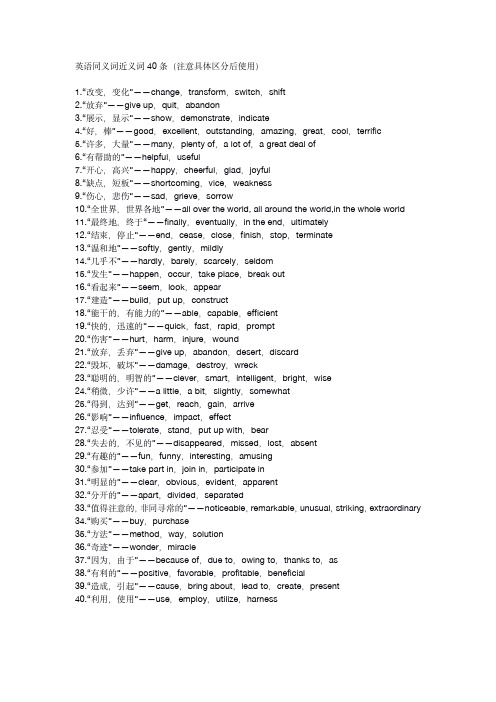
英语同义词近义词40条(注意具体区分后使用)1.“改变,变化”——change,transform,switch,shift2.“放弃”——give up,quit,abandon3.“展示,显示”——show,demonstrate,indicate4.“好,棒”——good,excellent,outstanding,amazing,great,cool,terrific5.“许多,大量”——many,plenty of,a lot of,a great deal of6.“有帮助的”——helpful,useful7.“开心,高兴”——happy,cheerful,glad,joyful8.“缺点,短板”——shortcoming,vice,weakness9.“伤心,悲伤”——sad,grieve,sorrow10.“全世界,世界各地”——all over the world,all around the world,in the whole world11.“最终地,终于“——finally,eventually,in the end,ultimately12.“结束,停止”——end,cease,close,finish,stop,terminate13.“温和地”——softly,gently,mildly14.“几乎不”——hardly,barely,scarcely,seldom15.“发生”——happen,occur,take place,break out16.“看起来”——seem,look,appear17.“建造”——build,put up,construct18.“能干的,有能力的”——able,capable,efficient19.“快的,迅速的”——quick,fast,rapid,prompt20.“伤害”——hurt,harm,injure,wound21.“放弃,丢弃”——give up,abandon,desert,discard22.“毁坏,破坏”——damage,destroy,wreck23.“聪明的,明智的”——clever,smart,intelligent,bright,wise24.“稍微,少许”——a little,a bit,slightly,somewhat25.“得到,达到”——get,reach,gain,arrive26.“影响”——influence,impact,effect27.“忍受”——tolerate,stand,put up with,bear28.“失去的,不见的”——disappeared,missed,lost,absent29.“有趣的”——fun,funny,interesting,amusing30.“参加”——take part in,join in,participate in31.“明显的”——clear,obvious,evident,apparent32.“分开的”——apart,divided,separated33.“值得注意的,非同寻常的”——noticeable,remarkable,unusual,striking,extraordinary34.“购买”——buy,purchase35.“方法”——method,way,solution36.“奇迹”——wonder,miracle37.“因为,由于”——because of,due to,owing to,thanks to,as38.“有利的”——positive,favorable,profitable,beneficial39.“造成,引起”——cause,bring about,lead to,create,present40.“利用,使用”——use,employ,utilize,harness。
- 1、下载文档前请自行甄别文档内容的完整性,平台不提供额外的编辑、内容补充、找答案等附加服务。
- 2、"仅部分预览"的文档,不可在线预览部分如存在完整性等问题,可反馈申请退款(可完整预览的文档不适用该条件!)。
- 3、如文档侵犯您的权益,请联系客服反馈,我们会尽快为您处理(人工客服工作时间:9:00-18:30)。
表示“需要”(v)的单词:need, require, involve ,entail表示“意味着”的单词:mean, involve, entail表示“宿舍”的单词:dormitory, quarters, lodgings表示“住宿”的单词:accommodations, (a)lodging表示“欺骗”(v)的单词:cheat, deceive, trick, fool表示“渴望”(v)的单词和词组:desire, yearn for/after, long for, thirst for,aspire to do sth, look forward to doing sth, keen on/about doing sth, keen to do sth, keen that, have an urge to do sth(具有做某事的强烈欲望,非常想做某事,形容极度渴望)表示“同情”(v)的词组:sympathize with, yearn for, feel sympathy for表示“重要的”的单词:important, crucial, vital, essential, integral, indispensable, significant表示“参加,从事”的词组:take part in, join(in),participate in, involve sb in (主动, 其被动形式为sb be involved in), sb be engaged in=sb be employed in表示“能力”的单词: ability和 capability(主要用于人)talent(只用于人), competence, capacity(可用于人或物), faculty表示“想象”(v)的单词和词组:imagine, fancy, fantasy,envisage(英)=envision(美) conceive of表示“包含(v)”的单词和词组:include, involve, comprehend, inclusive of, embrace, embody, comprise, contain(实际包含的量),encompass表示“能容纳”的词组:can hold/accommodate表示“表现,体现”(v)的单词:render, reflect, display, indicate, manifest, embody 表示“导致,引起(v)”的单词和词组:render, entail, lead to, result in, bring about, cause, trigger=prompt(诱发),pose(本义为造成问题或危机)表示“强大的,强有力的”的单词和词组:powerful, mighty, potent, strong表示“(感觉等)敏锐的,灵敏的”的单词:keen, acute(首选这两个词)perceptive表示“提供”的单词和词组:provide/supply sb with sth=provide/supply sth for sb=render/offer sb sth, contribute sth to sth表示“忙于……,埋头于……”的单词和词组:be buried in, be employed in, be engaged in, sb be immersed in=immerse oneself in表示“致力于”的词组:devote oneself to =dedicate oneself to,sb be devoted to=sb be dedicated to表示“表现,体现”(v)的单词:render, reflect, manifest, characterize表示“显示,表明”(v)的单词:show, suggest, indicate, reflect, reveal,(首选这三个词)emerge表示“证明”(v)的单词:validate, demonstrate, verify, confirm,prove表示“证实(v)”的单词:affirm,confirm, prove表示“说明,阐释(v)”的单词:explain, illustrate, elaborate表示“持续不断的”的单词:continual,continuous, incessant表示“(计划,规定等)被实施,生效”的词组有come into effect/force, be implemented, be put into effect/execution, be carried into execution=be put in/into execution 表示“意识到+从句”的词组:know+that从句 realize+that从句 be/become aware of the fact+ that从句 be conscious+that 从句表示“阻止,阻碍”(v)的单词或词组:prevent/inhibit/hinder sb from doing sth, impede sb to do sth, hamper sb in doing sth表示“强烈的,剧烈的”的单词:severe, intense, violent, poignant, acute,keen表示“严重的”的单词:serious, severe, acute, grave表示“着名的,闻名的”的单词:famous(一般用于褒义),eminent, distinguished,(well-)known(褒贬均可),renowned, famed, conspicuous表示“臭名昭着的”的单词:notorious, infamous表示“显着的,引人注目的”的单词:remarkable, conspicuous, significant(首选这三个词)distinguished, noticeable, outstanding, striking表示“枯燥乏味的,沉闷的”的单词:dull, boring, tedious, dreary, monotonous表示“有利于,有助于”的词组:contribute to=be good for=be beneficial/conducive to 表示“限制”(n)的单词:bound, limit, limitation, restriction, confine, constraint 表示“限制”(v)的单词: limit, restrict, confine, constrain表示“易传染的,传染性的”的单词:contagious, infectious表示“(表意,言辞等)不明确的,模糊的,模棱两可的”的单词:ambiguous, implicit, vague, obscure, indefinite,unclear表示“区分A和B”的词组:distinguish A from/and B, discriminate/differentiate between A and B, discriminate A from B,make a distinction between A and B表示“赋予……特征”的单词:distinguish, feature, characterize表示“象征(v)”的单词: symbolize, represent(有“表示”的意思), embody(有“蕴含”的意思)表示“消化,吸收(v)”的单词:digest, absorb, assimilate表示“帮助”(v)的词组: assist sb in doing sth=help/assist sb to do sth表示“面对”的单词:face, confront(首选), envisage表示“面对……”的词组:face /confront/envisage sth= be faced/confronted with sth 表示“……圈,……界”的单词:arena, sphere, circle, realm表示“法律,法规”的单词:regulation, law, legislation表示“调整,调节”(n)的单词:adjustment, regulation, conditioning, modulation表示“使某人自己适应某物/做某事”的词组: adjust/ adapt/accustom/condition oneself to sth/doing sth=adjust/adapt oneself to sth/doing sth (以上强调从不适应或习惯变为适应或习惯的过程) sb be used/accustomed to sth/doing sth.(强调状态)表示“(在法律,道德等层面上)义务性的,强制性的,(课程等)必修的”的单词:obligatory, compulsory, mandatory表示“决定……”的词组:be determined/resolved to do sth=determine/resolve to do sth,determine/resolve that…= be determined/resolved that…, decide to do sth, decide that…表示“建议,主张”(v)的单词:suggest, recommend, advocate, propose, urge(极力主张)表示“主张(n)”的单词:advocacy, proposal, proposition表示“支持者,拥护者”的单词:supporter, proponent, advocate, protagonist表示“主要的”的单词:main, major, principal, primary表示“变化,改变”(v)的单词和词组:change, vary, alter, modify, transform, convert, turn, metamorphose, transmute,Change / convert/transform/ turn/alter A into B表示“变化,改变(n)”的单词:alteration, change, modification, conversion,metamorphosis(彻底改变),transmutation(转变为具有一种与原来完全不同的状态或形式的事物)transformation(变为与原事物完全不同的事物)表示“变更计划”时用alter/alteration, 表示“修订(书籍等)时”用revise/ revision (如the 5th edition——completely revised!)表示“衣橱”的单词:closet, dresser, wardrobe表示“阻碍,阻止”(v)的单词:prevent, impede, inhibit, hinder, obstruct, bar 表示“微生物”的单词:microorganism, microbe表示“细菌”的单词:germ(病菌), bacteria表示“修改”(v)的单词:modify, adapt, revise(修改文章, 修订书籍等) correct(改正/更正错误), alter表示“忠诚的,真诚的,真挚的”的单词:loyal, faithful, sincere, devoted,earnest 表示“忠诚(n)”的单词:loyalty, devotion, sincerity, faithfulness, allegiance 表示“选择”(n)的单词:choice, alternative, option表示“替代品”的单词:alternative, substitution, substitute表示“后面的”的单词:hinder, back, rear表示“养老院,敬老院”的单词和词组:gerocomium, geracomium(both are not available in paper dictionaries at present), old people’s home, home for the elderly/aged, seniors’ home, nursing home表示“太平间”的单词和词组:morgue, mortuary, dead room表示“专门地,有针对性地”:specially(特地,专门地)specifically(首选), exclusively (专门地,只限于)表示“不同,差异”的单词:difference, distinction, variation(change or slight difference)表示“爱好,喜好”的单词:hobby, fancy, preference表示“隔离”(v)的单词:separate, isolate, insulate, segregate, quarantine表示“合理的”的单词:reasonable, satisfactory, decent (首选这三个词),rational, logical表示“正直的”的单词:righteous, decent(首选这两个词), honest表示“正直(n)”的单词:integrity, righteousness, (首选这两个词) honesty表示“vt&vi 注册,登记”的单词:register, enroll(=enrol)表示“鼓舞(n)”的单词:encouragement, incentive, stimulation表示“刺激,激励(n)”的单词:incentive, stimulation, stimulus表示“符号,标志”的单词:symbol, icon, mark, sign, notation表示“目标”的单词:object, objective, aim, goal表示“目的”的单词:object, objective, aim, purpose表示“A在B之前”的词组:A be prior/preliminary to B, A be before B, A precedes B表示“完整的,完全的”的单词:intact, complete, prefect表示“渺小的,微不足道的”的单词:tiny, negligible, insi g nificant(g不发音),minute 表示“深入的,彻底的”的单词:in-depth, thorough, intensive, exhaustive表示“详尽的”的单词或词组:elaborate, at large, in (minute)detail, detailed, comprehensive, minute, exhaustive(极其详尽的,详尽无遗的)表示“过时的”的单词:outdated, outmoded, obsolete, old-fashioned表示“A与B有关”的词组:A be related/relevant to B, A concerns B,A relates/pertains to B表示“A 与B一致/相符”的词组:A be in accord/accordance/agreement with B, A be corresponding to, A corresponds to B, A be in correspondence to B表示“影响(n&v)”的单词:affect(过程,vt, -), effect(结果,n,+-均可), influence(n&vt, +-均可),impact(结果,u&vt, +-均可)( +-分别表示“积极的”和“消极的”)表示“足够的”的单词:adequate, ample, sufficient, enough表示“同情(n)”的单词:sympathy, compassion(比pity更正式), pity表示“冷淡的,冷漠的”的单词:indifferent, apathetic, dispassionate表示“激怒(v)”的单词:anger, annoy(惹恼), irritate, aggravate, infuriate(使狂怒)表示“(使)恶化 (v)”的单词和词组:get/become worse, worsen, aggravate(vt), deteriorate(vi)表示“惩罚(v)”的单词: punish, penalize表示“惩罚(n)”的单词: punishment, penalty表示“忏悔(v)”的单词:repent, confess表示“忏悔(n)”的单词: penitence, repentance, confession表示“倾向于(做)……,容易(做)……”的词组:be prone/inclined(均为adj) to (do) sth, tend(vi) to do sth表示“易受……影响的”:be su scep tible/vulnerable to (doing) sth表示“易受……的伤害的,易患……疾病的”:be susceptible/vulnerable to (do) sth, be prone to (do) sth表示“(证据)确凿的”的单词:conclusive(absolutely true), concrete(definite and specific),Solid(reliable and based on facts)表示“保证,担保(v)”的单词:assure, ensure, guarantee表示“节奏,步调”的单词:rhythm, pace, tempo表示“观念,意识”的单词:conception, awareness(偏重“意识”)【表示“观念”用conception,表示“意识”用conception或awareness均可】表示“认识(n)”的单词:conception,perception,understanding, view表示“理解,看法(n)”的单词:understanding(偏重“理解,认识”(n)), perception, perspective, view, notion表示“洞察力”的单词:insight, perspective, perception(均不可数)表示“提升,加强(vt)”的单词:improve, enhance, increase, heighten, raise如:improve/enhance/increase /heighten /raise awareness表示“敏锐的”的单词:acute, keen ,perceptive表示“视野(n)”的单词:vision, horizon, perspective(本义为“视角, 角度”=point of view)view表示“拓宽,扩大(v)”的单词:expand, broaden, widen, enlarge表示“促使(v)”的动词:prompt, drive(多用于不好的情况), induce表示“例如”的词组(用于句首):For example/instance, To illustrate=To be specific 表示“风景名胜”的词组:place of interest, tourist destination/attraction, scenic spot/attraction表示“拓展视野”的词组:broaden/widen/expand/enlarge one’s vision/horizon/perspective表示“发出信号”的词组:send (out) a signal, emit a signal表示“散发气味”的词组:give off/ release/ emit a specific kind of smell表示“散发光或热”的词组:radiate/ emit/ give off/ send out light/ heat表示“释放(排放)气体”的词组:release/ emit/ give off gases表示“发出警报声”的词组:emit/ send out/ produce an alarming sound表示“增强某物的强度,加剧”的单词:intensify(vi&vt) (好坏均可) ,amplify(vt)(好坏均可),escalate(vi&vt, 坏), deteriorate(vi, 坏), aggravate(vt, 坏)。
